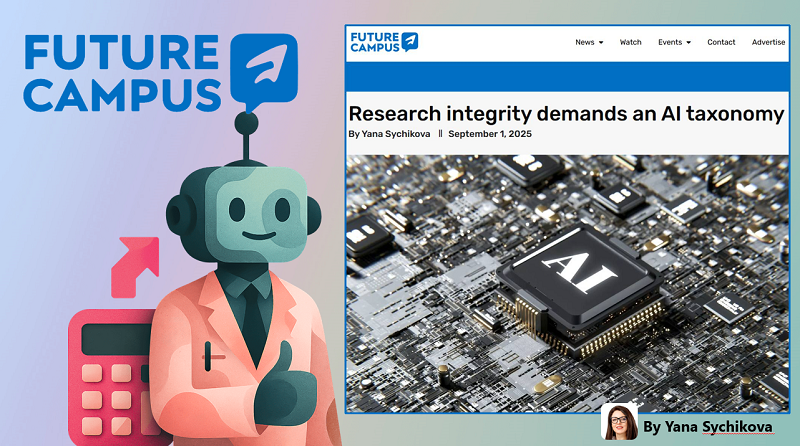Проректорка з наукової роботи БДПУ Яна Сичікова розповіла для Future Campus про те, чому академічна доброчесність потребує таксономії GAIDeT.
У колонці “Research integrity demands an AI taxonomy”, опублікованій 1 вересня 2025 року у Future Campus, проректорка з наукової роботи БДПУ Яна Сичікова наголосила: університети по всьому світу поспішають ухвалювати політики щодо використання штучного інтелекту, проте більшість із них залишають студентів і викладачів у невизначеності.
Вихід, за словами Яни Сичікової, пропонує таксономія GAIDeT (Generative AI Delegation Taxonomy). Вона базується на простому принципі: потрібно чітко вказати, який саме інструмент і версія були використані, які завдання делеговано ШІ, і хто несе відповідальність за кінцевий результат. Це займає кілька рядків, знімає стигму та перетворює політику на практику.
«GAIDeT дозволяє чесно пояснити, що саме робив ШІ у дослідженні, підкреслюючи: відповідальність завжди залишається за людиною-дослідником. Це не про контроль чи “полювання на відьом”, а про відновлення довіри в науці», — підкреслює проректор БДПУ.
Чому університети виграють найбільше
GAIDeT особливо цінний для університетів:
- викладачі отримують зрозумілі орієнтири й більше не змушені гадати, чи «тут працював GPT»;
- студенти почуваються у безпеці, адже відповідальне й відкрите використання інструментів вбудоване у правила;
- керівництво університетів отримує готовий блок для включення у регламенти, шаблони дипломних робіт та положення про академічну доброчесність — без додаткових витрат і затримок.
«ШІ вже серед нас — у текстах, аудиторіях, браузерах і навіть у Google Docs. Проблема не в самій технології, а в хаосі й недовірі довкола її застосування. GAIDeT дає ясність і робить прозорість звичною практикою. Це те, що університети можуть інтегрувати вже сьогодні».
Таксономія GAIDeT була опублікована у провідному міжнародному журналі Accountability in Research (2025) і вже активно обговорюється у світовій академічній спільноті. Ця ініціатива виходить далеко за межі України й завойовує популярність серед університетів, редакторів і дослідників у різних країнах.
Future Campus представляє себе як «платформу, яка сприяє передачі академічних знань, підтримує установи в адаптації до технологій наступного покоління та сприяє інноваційним процесам досліджень та розробок». Автори поєднують дослідження із потребами галузі, як-от розповідь про таксономію GAIDeT.
Суспільство і наукова спільнота потребує таких унормувань, адже, врешті-решт, як і репутація досліджень буде збережена, так і науковці та науковиці матимуть чіткий план дій.
Дар’я Кізілова
Future Campus about GAIDeT: “this is something that universities can integrate today”

BSPU Vice-Rector for Research Yana Sychikova Explains to Future Campus Why Research Integrity Needs the GAIDeT Taxonomy.
In her column “Research integrity demands an AI taxonomy”, published on September 1, 2025 in Future Campus, BSPU Vice-Rector for Research Yana Sychikova emphasized: universities around the world are rushing to adopt policies on the use of artificial intelligence, yet most leave students and faculty in uncertainty.
The solution, according to Sychikova, is offered by the GAIDeT (Generative AI Delegation Taxonomy). It is based on a simple principle: clearly specify which tool and version were used, which tasks were delegated to AI, and who is responsible for the final result. This takes just a few lines, removes stigma, and turns policy into practice.
“GAIDeT allows us to explain honestly what exactly AI did in research, while stressing that responsibility always remains with the human researcher. It is not about control or a ‘witch hunt,’ but about restoring trust in science,” — notes the BSPU Vice-Rector.
Why universities benefit the most
GAIDeT is particularly valuable for universities:
- Lecturers receive clear guidelines and no longer need to guess whether “GPT was used here.”
- Students feel safe, as responsible and open use of AI tools is embedded into the rules.
- University leadership gains a ready-made block to include in regulations, thesis templates, and academic integrity policies — without additional costs or delays.
“AI is already among us — in texts, classrooms, browser tabs, and even Google Docs. The problem is not the technology itself, but the chaos and distrust surrounding its use. GAIDeT provides clarity and makes transparency a routine practice. This is something universities can integrate today.”
The GAIDeT taxonomy was published in the leading international journal Accountability in Research (2025) and is already being actively discussed within the global academic community. This initiative goes far beyond Ukraine and is gaining popularity among universities, editors, and researchers worldwide.
Future Campus positions itself as “a platform that facilitates the transfer of academic knowledge, supports institutions in adapting to next-generation technologies, and fosters innovative research and development processes.” The authors combine research with industry needs, such as the narrative of the GAIDeT taxonomy.
Society and the scientific community require such regulations, as ultimately, both the reputation of research will be preserved, and scientists will have a clear action plan.
Daria Kizilova
